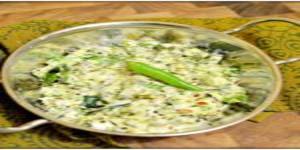
Scope
Pachadi refers to a traditional South Indian fresh pickle served as a side dish. Broadly translated, it refers to food which has been pounded. In Karnataka, Kerala and Tamil Nadu, pachadi is a side dish curry and is made with vegetable, yoghurt, coconut, ginger and curry leaves and seasoned with mustard.
Pachadi generally is a mildly spiced coconut and yogurt-based dish made with seasonal vegetables or fruits. It is made of fresh vegetables and is served as an accompaniment for rice and for snacks like idli, dosa, and pesarattu. Many kinds of vegetables are included. Sometimes the peel of a vegetable is used, such as the peel of the ridged gourd, cucumber, etc.
Fundamental Concepts and Principles
Following ingredients are required for making Vegetable & Tuber Pachadi :
- Vegetables/Tuber – 12 palam
- Curd – ¼ padi
- Salt – ¼ palam
- Green Chillies – ½ palam
Seasoning Method
Ghee – ½ palam
Red Chillies – ? palam
Black Gram – ¼ palam
Mustard – ? palam
Bengal Gram – ¼ palam
Method:
1. The vegetables used here are pumpkin, snake gourd, goose berries, mangoes, raw bananas, cucumbers, ladies finger etc. The root vegetables are potatoes, colocasia, beetroot, radish, turnip or shalgam etc.
2. Select good and big vegetables, keep them on fire to cook on all sides. These vegetables can be burnt in the fire or cooked in the water. After cooking, cool the vegetables.
3. Put curd and salt in a coated vessel. Remove the edges of the green chillies and cut it into smaller pieces. Fry them in ghee and mix them with the curd along with the fried or cooked vegetables. If the vegetables are hot, the curd will leave water.
4. Mash well.
5. Refer to recipe no. 22 for seasoning procedure.
Hindu Compliance Body
The Hindu compliance body was established under the executive order of The Supreme Pontiff of Hinduism, dated August 14, 2020, order number 10010, under the title Reviving the Hindu Compliance System and Body
to create, promote, spread and teach the standard procedures for all products and services that are in compliance Hindu Shastras.
Copyright
HCS has the copyright of all its publications. No part of these publications may be reproduced in any form without the prior permission in writing to HCS. This does not preclude the free use, in the course of implementing standard, of necessary details mentioned above. Enquiries related to copyrights to be addressed to KAILASA.
